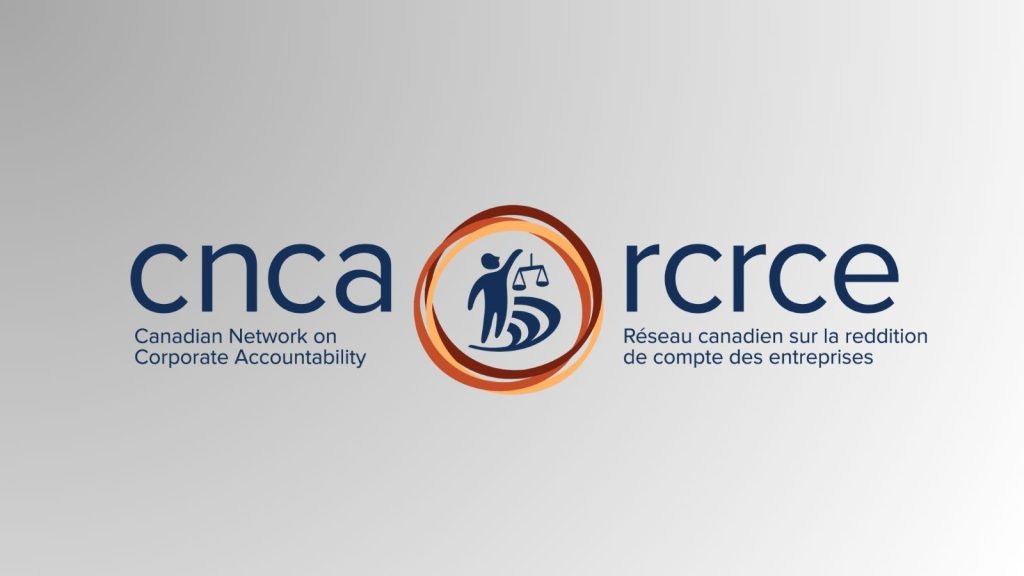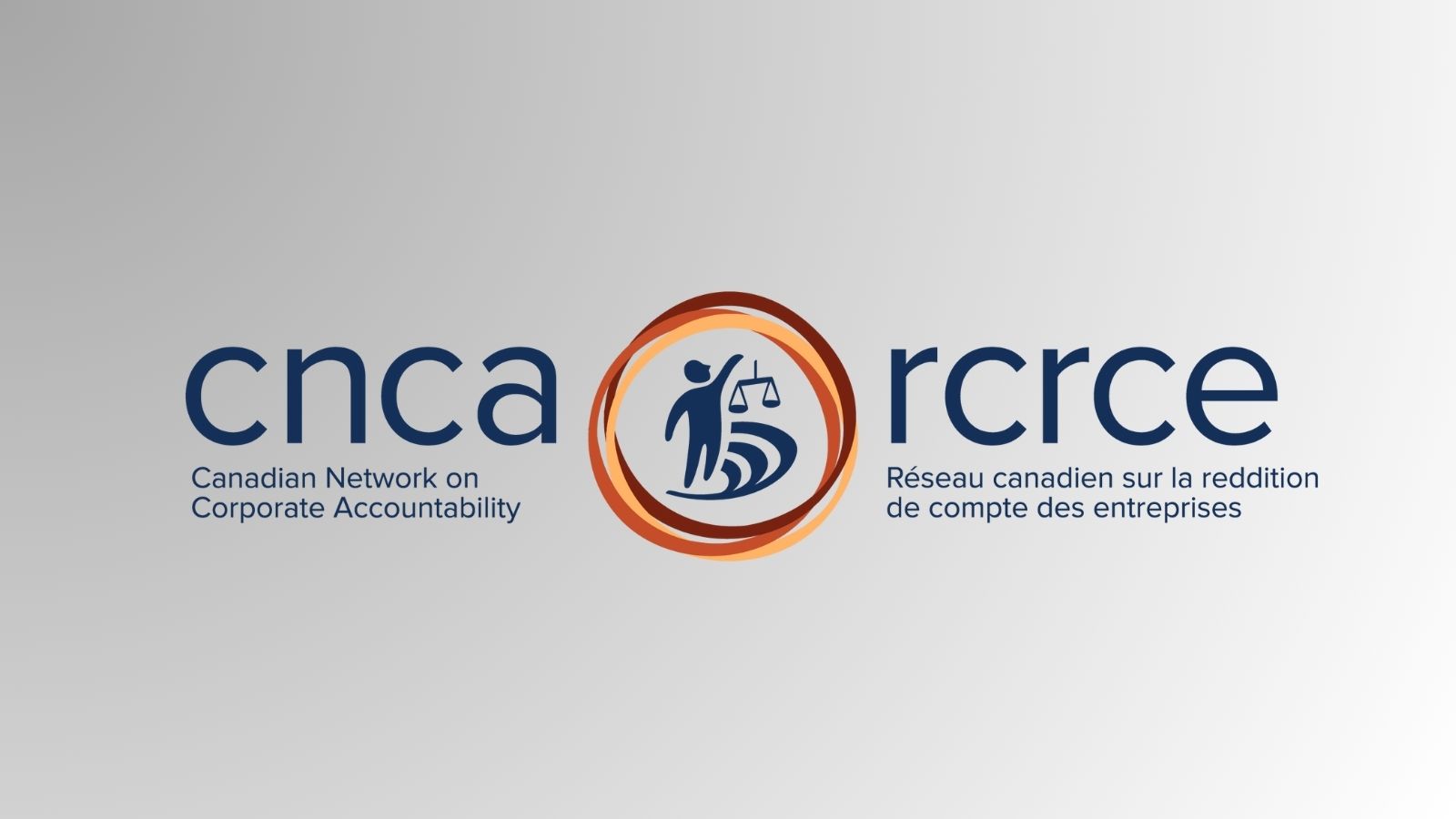In October 2020, the CNCA wrote to the Honourable Mary Ng, Minister of Small Business, Export Promotion and International Trade, asserting that the legacy of the pandemic should not be a rolling back of the clock on respect for human rights by Canadian businesses operating around the world; rather Canada should re-establish its position on the global stage, and become a global leader in business and human rights.
Read the full October 2020 CNCA letter to Minister Ng (PDF)
===
Building back better requires urgent action on corporate accountability
TO: The Honourable Mary Ng P.C, M.P.; Minister of Small Business, Export Promotion and International Trade; House of Commons; Ottawa, ON
CC: The Honourable Francois-Philippe Champagne, Minister of Foreign Affairs The Honourable Karina Gould, Minister of International Development; MP Garnet Genius; MP Alexis Brunelle-Duceppe; MP Heather McPherson; MP Elizabeth May; Jennifer Henry, Executive Director, Canadian Ecumenical Justice Initiatives; Ketty Nivybandi, Secretary General, Amnesty International Canada; Hassan Yussuff, President, Canadian Labour Congress
26 October 2020
Dear Minister Ng:
I am writing on behalf of the 39 member organizations of the Canadian Network on Corporate Accountability (CNCA) to urge you to take concrete measures towards advancing respect for human rights by businesses throughout their global operations and supply chains, and to request a meeting at your earliest convenience.
Our network unites human rights, labour, international development, environmental and faith based organizations from across Canada who collectively represent the voices of millions of Canadians. Together we call for Canadian law and policy reform to ensure that: impacted communities can access remedy in Canada; Canadian companies respect human rights in their global operations; and, if companies are involved in overseas abuses, they face real consequences in Canada.
In December 2019, our network requested an urgent meeting with you. That meeting was scheduled for March 12, 2020, and our network was to be represented by Hassan Yussuff, President of the Canadian Labour Congress, Alex Neve, Secretary General of Amnesty International Canada, Jennifer Henry, Executive Director of KAIROS: Canadian Ecumenical Justice Initiatives and myself. However, as a result of the declaration of the global pandemic, your office canceled that meeting and indicated that it would not be rescheduled “until the COVID-19 outbreak and response is more stable.”
We understand the urgency of responding to the unprecedented COVID-19 pandemic, yet this threat cannot be addressed in isolation from Canada’s efforts to strengthen our supply chains and to ensure that Canadian companies are respecting human rights throughout the entirety of their global business operations. The global pandemic has shone a light on the importance of Canadian trade and supply chains, but has also exposed the governance gaps that have harmed workers and communities around the globe. In fact, the global pandemic has created new risks to the safety and security of human rights defenders and workers. It is of utmost importance that we work together to address Canadian corporate accountability gaps and to ensure that the pandemic does not solidify the clawing back of promised measures to ensure business respect for international human rights. Canada must seize the current opportunity to re-establish its global position as a champion for human rights.
There are several reasons why it is important to act now on Canada’s business and human rights obligations:
1. Building back better requires decisive action on corporate accountability:
The legacy of the pandemic must not be rolling back the clock on respect for human rights by Canadian businesses operating around the world.
The harmful impacts of some Canadian business operations overseas are widespread and well documented. Canada’s failure to regulate, investigate and ensure access to remedy for such harms is a stain on Canada’s reputation in the world and an impediment to fulfilling our international human rights commitments. This failure has attracted the attention of United Nations and regional human rights bodies, [1] communities and workers from around the world [2] and Canadians from coast to coast to coast. [3]
For over fifteen years, we have been calling on the Government of Canada to take serious action to respond to harms and allegations linked to Canadian business operations overseas.
We were greatly encouraged, in January 2018, when the Government of Canada publicly committed to creating an independent ombudsperson’s office to investigate allegations of abuse, with the mandate and tools needed to be effective.
Specifically, the Government of Canada promised that the CORE would:
- be independent;
- have the powers needed to independently investigate complaints thoroughly, including the power to compel documents and testimony from Canadians and Canadian companies;
- have an adequate budget to operate; and
- have a mandate to report publicly.
The content of that announcement drew positive international attention and, if meaningfully implemented, would have positioned Canada as a global leader in business and human rights.
Unfortunately, when the first Canadian Ombudsperson for Responsible Enterprise was appointed in April 2019, her mandate and powers were inconsistent with what had been promised a year earlier and were inadequate to serve the purpose for which the office was created.
The meaningful implementation of the promised office has been lacking. As recently as September 2019, former international trade minister Jim Carr indicated that he had asked his officials to begin the work required to pursue “a stand-alone legal framework for the office, including stipulating its powers to compel documents, witnesses, and other key testimony.” However, since the federal election, progress appears to have been slow, and has completely stalled since the declaration of the global pandemic.
While it is understandable that the Government of Canada has needed to prioritize the response to the unprecedented COVID-19 pandemic, the need to institute corporate accountability measures has not become any less urgent. The human rights risks faced by workers, women, Indigenous peoples, human rights and environmental defenders negatively impacted by Canadian business operations overseas have not been eliminated by the emergence of the pandemic. Instead, it has increased their vulnerability. In addition to the new public health crisis, in some cases, the risks faced by the most vulnerable have been exacerbated. For example, basic workers’ rights in Bangladesh’s garment sector – such as being paid for the work that you complete – have been threatened. Since the declaration of the pandemic some fashion brands, including those who produce for Canadian markets, have cancelled clothing orders “that are already complete or in process, refusing to pay for them and abandoning workers for the hours they’ve already worked.” [4]
2. The office of the Canadian Ombudsperson for Responsible Enterprise (CORE) will soon be opening its doors to receive complaints, and still does not have the basic minimum powers required to be fit for purpose.
The urgency in delivering on the promised mandate and powers is heightened by the fact that the CORE has announced that it will be finalizing its standard operating procedures this month, and plans to open its doors to complaints in early November 2020. Without independent investigatory powers, the CORE will be unfit for purpose and will suffer the same fate as its predecessors.
Impartial investigation is essential to the resolution of conflict, the identification of appropriate remedy and the prevention of harm. It can begin to address the acute power imbalance between communities and multinational companies. But key information that is crucial to such investigations is often held exclusively by companies. In order to ensure the integrity and effectiveness of investigations, the CORE must be given the powers to access this essential information.
Given the absence of these basic minimum powers to fulfill the office’s mandate, the members of the CNCA will not be able to recommend that the impacted communities and workers that we work with in every corner of the world make use of the CORE. In fact, we have felt the obligation to warn our global partners to approach the CORE with caution.
3. Standing up for who we are as Canadians means leading – not lagging – in respect for international human rights.
Other advanced economies understand that meaningful measures to address corporate malfeasance are essential to long term prosperity and sustainability.
For example, there is growing momentum across Europe in the establishment of comprehensive mandatory human rights due diligence legislation and legislative proposals that require companies to identify, prevent, mitigate and remedy human rights risks throughout their global operations and supply chains. The European Commission’s proposal for a post-pandemic recovery plan includes corporate governance as “an essential and long overdue starting point to help us all build back better.”5 Canada is falling behind the emerging global consensus that governments must do more to ensure business respect for human rights.
What is particularly regrettable is that Canada was positioned in January 2018 to become a global leader in business and human rights. Through its lack of implementation of the promised independent ombudsperson, and the tremendous developments across Europe, it has become a laggard. The fact that the Government of Canada reneged on its very public commitments and appointed an ombudsperson in name only, is a further black mark. Canada now has significant work to do just to catch up.
Our network would like to help you to re-establish Canada’s position on the global stage and shift from a laggard to a global leader in business and human rights. We urge you to take concrete measures towards advancing the following three business and human rights priorities for Canada:
1. As an immediate first step, make the recently created Canadian Ombudsperson for Responsible Enterprise (CORE) independent and provide the CORE with the power to compel documents and testimony so it can effectively investigate human rights abuse allegations linked to Canadian corporations operating overseas.
2. Support the development of comprehensive mandatory human rights due diligence (mHRDD) legislation. mHRDD legislation requires companies to identify, prevent and mitigate human rights abuses and provides for liability when companies cause harm in their global operations (subsidiaries and supply chains).
3. Introduce effective and transparent due diligence requirements for Canadian embassies, Export Development Canada, FinDev Canada, and other government agencies to prevent these public agencies from supporting, financing and insuring business activity that is linked to human rights abuse.
We hope to hear back from you shortly in order to schedule a meeting to discuss these important aims.
Sincerely,
Emily Dwyer; Coordinator, Canadian Network on Corporate Accountability
===





